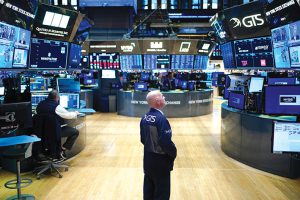BLOOMBERG
European bonds and stocks fell after the latest round of price data suggested inflation may not yet be fully on the retreat in the euro region. Germany’s 10-year yield jumped as much as six basis points to 2.57% after reports showed inflation accelerated in four of six German states in August, ahead of figures for the overall German economy, which was expected on Wednesday. A separate report showed Spanish inflation also quickened.
The Stoxx Europe 600 dropped, with utilities underperforming as Orsted A/S plunged more than 20% after the Danish power generator forecast potential impairments of up to $2.3 billion relating to its US portfolio. Among other individual movers, Prudential Plc climbed more than 4% after posting a rise in new business profit.
The German and Spanish inflation data muddied the waters for European policy makers as they approach the September rates decision. Market pricing implies roughly even odds of a quarter-point increase by the European Central Bank to 4% next month. Further clouding the outlook was data showing that euro-area economic confidence slowed anticipated this month.
US equity futures slid, following a jump in the S&P 500 by the most since June on Tuesday after unexpectedly soft jobs and consumer-confidence readings in the US raised hopes the Federal Reserve may be nearing the end of its tightening cycle. HP Inc slumped almost 10% in premarket trading after the technology hardware company cut its full-year cash flow and profit outlook. Treasury yields ticked higher and a gauge of the dollar was steady.
“Markets have swung from narrative to narrative with the soft landing one winning out handsomely, or as a minimum the narrative that the Fed is more likely than not to be done hiking,” said Jim Reid, a strategist at Deutsche Bank AG. Investors were expected to monitor data on US economic growth to further ascertain the economy’s resilience amid high interest rates.
In Asia, the MSCI Asia Pacific Index came off its highs as the strong rally in Chinese equity markets gradually evaporated. Benchmarks had earlier rallied, with the Hang Seng Index rising as much as 1.4%, after Chinese state-owned lenders were reported to prepare to reduce rates on the majority of outstanding mortgages, as well as on deposits.
“These little piecemeal policy shifts are probably very good in the short term for sentiment, but they don’t necessarily create this sort of surge in terms of the local economy,” Dwyfor Evans, head of APAC macro strategy at State Street Global Markets, said.
 The Gulf Time Newspaper One of the finest business newspapers in the UAE brought to you by our professional writers and editors.
The Gulf Time Newspaper One of the finest business newspapers in the UAE brought to you by our professional writers and editors.
